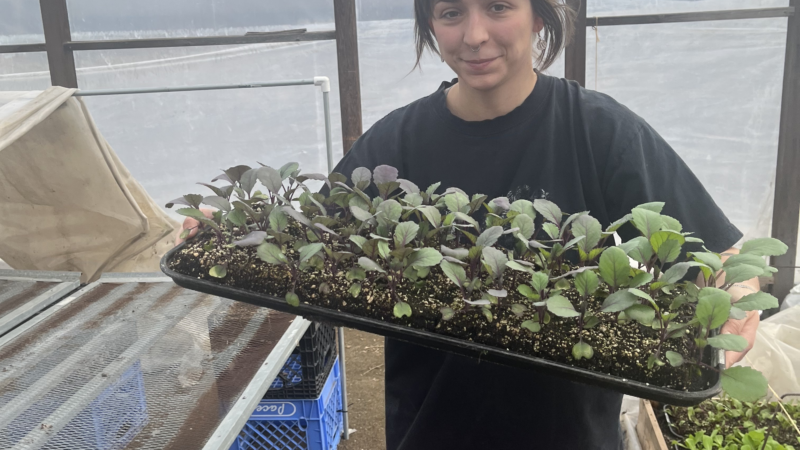What’s soil blocking? This seeding method helps gardeners use less plastic and peat
Spring means it’s time for gardeners to think about seedlings, those little baby plants all ready to get plunked into the ground. And a hands-on technique for growing them, called “soil blocking,” is capturing the attention of serious gardeners.
Among them is Christopher Hallett. He’s a farm manager at Growing Hope Urban Farm, a community garden center in Ypsilanti, Mich. Hallett started soil blocking a few years ago, and taught a class last week to six aspiring soil blockers in one of the facility’s outdoor greenhouses.
“Take your fingers and go, boom boom boom boom,” he says, demonstrating how to pack a mixture of peat moss, dirt, lime, perlite and other components into galvanized metal boxes equipped with a lever. The tool pushes out the packed soil blocks into neat rows, like an old-fashioned ice cube tray.
Many in the class were drawn to soil blocking because it’s an environmentally friendly method to prep seedlings.
“You don’t have to use as much plastic,” Donna Kolojeskie says. A retiree, she’s gardened her whole life. (“And I’m getting seedier by the day!” she jokes.) Kolojeskie says she’s enjoyed learning a new skill that can cut down on her purchases of disposable containers of seedlings at big box stores.
Even peat pots, Hallett points out, are not a sustainable resource.
“Those little fabric things around the peat pots are even worse,” he adds. “You can’t get rid of ’em. They say ‘biodegradable’ but they’re woven plastic.”
Soil blocking tools, he says, are economical as well as green. They cost less than $20 each, and should last for 20 years. The tools come in different sizes: small ones for herbs, big ones for squash. Another member of the class, Osprey Elliott, says she plans to start soil blocking this spring, even though she lives in an apartment.

“I have a shelf set up in my room with a light, like a mini greenhouse,” she says. Enough to start a few seedlings she hopes to give to friends. Meanwhile, Amorita Oliver tells her Growing Hope classmates she wants to improve her gardening game in order to become more self-sufficient.
“I’m not trusting food anymore that I’m getting, so I just want to grow my own,” Oliver says. “I want to learn how to do all kinds of stuff. We live in a crazy world.” She paused, laughed and shrugged. “I need to grow my own food. That’s where my head is.”
Meanwhile her hands are in the soil, busy blocking.

This story was edited for radio and the web by Meghan Sullivan, produced for radio by Chloee Weiner, and produced for the web by Beth Novey.
Guides to help you tackle your New Year’s resolutions
From building your strength to tackling credit card debt, NPR's Life Kit has a newsletter journey to help you tackle your New Year's resolution.
Guides to help you tackle your New Year’s resolutions
From building your strength to tackling credit card debt, NPR's Life Kit has a newsletter journey to help you tackle your New Year's resolution.
Dozens presumed dead in fire at Swiss Alps bar during New Year’s celebration
Dozens of people are presumed dead and about 100 injured, most of them seriously, following a fire at a Swiss Alps bar during a New Year's celebration, police said Thursday.
Warren Buffett officially retires as Berkshire Hathway’s CEO
The legendary 95-year-old investor spent decades building his company into one of the world's largest and most powerful. Now Greg Abel is taking it over.
Crypto soared in 2025 — and then crashed. Now what?
For most of 2025, cryptocurrencies such as bitcoin surged as President Trump vowed to make the U.S. a crypto leader. But now, a severe sell-off has shaken the sector.
Zohran Mamdani sworn in as New York City mayor, capping historic rise
Mayor Zohran Mamdani took the oath of office in New York City after midnight Thursday. The city's first Muslim mayor, a member of the Democratic Socialists of America, has promised to focus on affordability and fairness.






